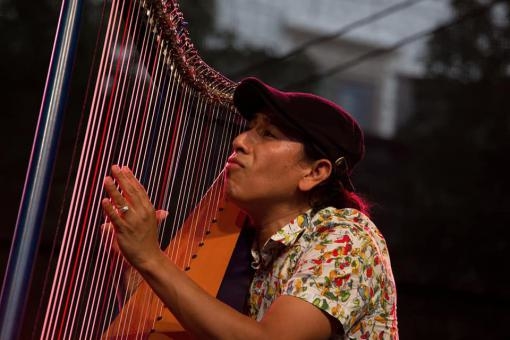Folkové prázdniny [Folk Holidays] in Náměšť nad Oslavou is a festival standing out with its dramaturgy, structure and atmosphere. Every season has its own theme, every evening has its own theme, and even some individual performances have their own themes. The long-time programme director Michal Schmidt managed this year to excellently balance Czech premiéres and truly extraordinary projects with reappearances and sure bets. This year's theme of Folkové prázdniny was About the Soul; however, this week-long event has its soul every year.
The soul as a motto of this year's season could have meant a greater proportion of sacred music, whatever we may imagine under this concept. And indeed it was possible to hear such music in Vysočina this year: from Mlýny and other sure bets by Spiritual Quintet to instrumental prayers of Colombian harpist Edmar Castañeda, a faithful Christian, or equally scalding music by Cuban pianist Omar Sosa, a devotee of the syncretic religion of santería, up to Gregorian chant that resounded one night in the Náměšť church. Spiritual features can be read between the lines of the lyrics of Jarda Svoboda (this time he did not come with Traband, but with a more relaxed project called Přítel člověka [Man's Friend]) and parallels to the Old Testament passages occasionally shine through in the otherwise secular texts of former Soviet Jews, which were reconstructed and staged by the international group Yiddish Glory.
Those who are not satisfied with the main evening and possibly night concerts, could link live music with lectures, discussions and debates, whether it was a two-day colloquium (this year on the theme of Music and Spirituality), lighter debates of journalists or perhaps the Monday discussion with the Canadian professor of Jewish Studies Anna Shternshis, who discovered some lost songs in archives in the early 1990s, which were then performed by the group Yiddish Glory. The colloquium discussed among other things spiritual elements in the lyrics of Spiritual Quintet, inspiration from the biblical Song of Songs in old compositions of Sephardic Jews and in the work of Jarda Svoboda; it was also discussed whether Gregorian chant or guitar songs should be heard in churches. Hence, the theoretical part of the festival had a clear connection with the concert part. And we have not even mentioned yet a huge, truly practical part of the festival, meaning dozens of workshops – visual art and otherwise creative, dancing and last but not least also music.
This year, however, the festival was also enjoyed by those who are indifferent to contextual interconnections and who do not look for sacred (or spiritual?) elements in music. The town of Náměšť heard outstanding instrumental music (the opening concert by the Hungarian violinist Félix Lajkó and the Polish string group Vołosi – this ensemble has been currently ranking high in the pan-European charts of world music; mighty ovations for the trio Talisk from Scotland; or a wonderful combination of three harps from different continents). And also vocal music – from experimental solo vocal of Lenka Dusilová undercoloured with electronics, through Moravian folklore from Kudlovice, to the power of the vocal polyphony of the group San Salvador from the French department of Corrèze.
Although a number of interesting instruments were presented during the festival, including the miniature concertina accordion, bagpipes or traditionally very strongly represented violins, this year was dominated by harps and West African kora. Kora player Seckou Keita returned to Náměšť after three years and appeared in three programmes – with Omar Sosa he played songs from their joint album Transparent Water, with the Welsh harpist Catrin Finch he introduced music from the current CD Soar, and everything culminated on Friday night with a unique project entitled Harfy nad Oslavou [Harps above Oslava River], in which Keita and Finch joined Edmar Castañeda, player on the Colombian arpa llanera, i.e. "harp from the plains". This concert followed up on projects from previous years such as Tři hlasy, Tři niněry, Struny nad Oslavou and Perkuse a hlasy [Three Voices, Three Hurdy-gurdies, Strings above Oslava River and Percussion and Voices]. It always happens that musicians from different countries (and often from different continents) meet up in Náměšť, create a joint repertoire on the spot and then play it. Beautiful and above all meritable and invaluable activity.
However, there were more extraordinary moments at the festival. They certainly include the concert premiére of a new programme by Luboš Malina and Kateřina García named Vprostřed noci… [In the Middle of the Night…] with Czech poetry set to music. The festival dernière of Spiritual Quintet was also exceptional in its own way. The concert maybe resembled too much the last year's show of this legendary band at the festival, but grateful fans were happy for all the good old hits and many realized that Spiritual Quintet, which announced the end of its activity for the spring of next year, might not be heard live any more. Among the strongest moments – besides the duo Sosa & Keita, the harps, Yiddish Glory or the band San Salvador – was also the last-minute concert by Toko Telo, a top band from Madagascar, yet completely unknown in this country. American gospel ladies Como Mamas, who cancelled their European tour, had an equal replacement in Náměšť.
Folk Holidays ended on Saturday 3 August with a concert by the Polish band Tęgie chłopy. Let us look forward to the next season and hopefully Michal Schmidt's well of ideas will not dry up and Folk Holidays will have not only a great dramaturgy next year, but also a key theme that will combine all this beautifully together.
Folkové prázdniny, Náměšť nad Oslavou, Renaissance chateau grounds, 27 July to 3 August 2019
































No comment added yet..